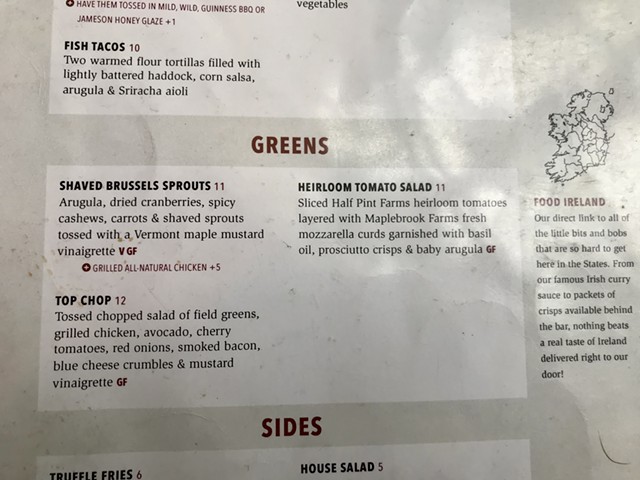
- Sally Pollak
- Heirloom Tomato Salad at Rí Rá
But Half Pint Farm hasn’t harvested tomatoes since the fall of 2017, and the first harvest of this season will be in about six weeks, said Mara Welton, who owns and operates the farm at Burlington's Intervale with her husband, Spencer Welton.
Mara Welton handles farm deliveries herself, transporting produce to about 30 restaurants in Chittenden County. In the 13 years that Half Pint has been growing tomatoes, Welton said she has never delivered them to Rí Rá.
“I’m infuriated. This is something that's been happening regularly," Welton said, meaning beyond this instance and this restaurant. “It happens on different levels and it erodes our brand, and I think it erodes every farm’s brand that is being used this way.”

- Sally Pollak
- Heirloom Tomato Salad at Rí Rá
“It’s from a menu in the summer, but it’s not something that I would put on the menu,” Patterson said. “I can’t really comment on where he [his predecessor] was sourcing the tomatoes. He was a frequent visitor of the [Burlington] Farmers Market out back.”
Helen Labun is executive director of the Vermont Fresh Network, a nonprofit that works to build relations between local farmers and chefs. She said it's difficult to gauge the prevalence of misrepresenting local foods on Vermont restaurant menus. But, she added, VFN is concerned about "local" being used as a "broad marketing scheme."
"That sort of marketing is what we’re concerned about becoming prevalent," Labun said.
The tomatoes in the “heirloom salad” at Rí Rá are served on a bed of arugula with bits of mozzarella cheese — billed on the menu as from Maplebrook Farm, a producer in North Bennington — and prosciutto chips. In a version served to a Rí Rá diner on Monday evening, the salad featured about 10 whole cherry tomatoes and a handful that were sliced in half.
Patterson said the restaurant gets cherry tomatoes from Black River Produce, a food distributor based in North Springfield. Efforts to reach Black River Produce by telephone were not successful.
But there is no chance that Black River could deliver Half Pint tomatoes even if they were in season. Half Pint Farm, which the Weltons founded 16 years ago, has never sold its produce through a distributor, Mara Welton said.
“We pride ourselves on harvesting all of our produce the day of delivery or the day before delivery," she said. "And that’s something we market to our chefs: getting the freshest possible tomato that’s been ripened on the plant so they have the fullest flavor.”

- Sally Pollak
- Menu at Rí Rá
“That’s what the Half Pint tomatoes are,” Atkins said. “They are the glory of fresh-from-the-garden tomatoes. Mara and Spencer are actually touching and holding each box and can guarantee the quality of every tomato that they bring our way.”
Working with Half Pint tomatoes is a "joy," Atkins added. The Kitchen Table Bistro presents a dinner every summer featuring the farm's tomatoes — preparing about 10 dishes that range from a "pristine" salad to sorbet.
“It’s a love affair from their side for the tomatoes,” Atkins said. “And we get to help partake of that love.”

- Courtesy of Half Pint Farm
- Half Pint Farm tomatoes
"The work is a labor of love," she said. "When it gets eroded, it's so dismaying. ... I've let these things go for so many years. I think [restaurants are] thinking, We’ll give these little farms some props. Having a small farmer’s name on the menu is good for us and good for them, so what’s the harm?
"But it’s a false experience for the customer," Welton continued. "And what if the tomatoes were kind of crappy? What if they’d been stored in the fridge?
"I think it does a big disservice to the customers because they think they’re getting a product they’re just plain not getting," she said. "They have an experience with the product that isn’t ours, and whatever that experience is isn’t real."
Speaking of...
-

Burlington Budget Deficit Balloons to $13.1 Million
Apr 25, 2024 -

Court Rejects Roxbury's Request to Block School Budget Vote
Apr 24, 2024 -

Q&A: Downtown Montpelier Transforms Into PoemCity Every April
Apr 24, 2024 -

The Café HOT. in Burlington Adds Late-Night Menu
Apr 23, 2024 -

Video: Visiting the Kellogg-Hubbard Library’s PoemCity in Montpelier During the Month of April
Apr 18, 2024 - More »





Comments (5)
Showing 1-5 of 5
Comments are closed.
From 2014-2020, Seven Days allowed readers to comment on all stories posted on our website. While we've appreciated the suggestions and insights, right now Seven Days is prioritizing our core mission — producing high-quality, responsible local journalism — over moderating online debates between readers.
To criticize, correct or praise our reporting, please send us a letter to the editor or send us a tip. We’ll check it out and report the results.
Online comments may return when we have better tech tools for managing them. Thanks for reading.